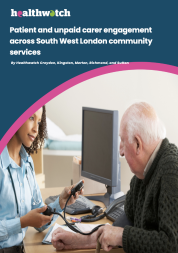Is Social Prescribing Working?

HWK has been supportive of the concept of social prescribing ever since the idea of developing a local social prescribing service first emerged around 2017-18. For example, a number of HWK volunteers helped test the Connected Kingston “digital tool”, part of Kingston’s social prescribing offer, when it was being developed in 2018.
Whilst being supportive of the principle of social prescribing as a model, HWK has also been seeking evidence that the overall Connected Kingston programme (of which Staywell’s Community Connector Service forms just one part and is funded separately to the rest of the programme), is actually making a difference, ie that the wider programme is improving the health and wellbeing of users and that the level of investment put into the other components of the programme is justified by the outcomes being secured.
It was in this context that, in 2018, Staywell offered to work with HWK to seek feedback from users of the Community Connector Service on the impact of this service on their health and wellbeing, several weeks (and in some cases, several months) after the provision of the service to the individual had ended. This provided an opportunity to examine the medium-term impact of the service adding to the qualitative data collected by the service from each individual at the point when provision of the face-to-face provision of the service had ended for the individual.
Our findings
What can readily be concluded from the data is that the people who did provide HWK with their views and information had a strongly favourable view of the service. Particularly striking in the data are the following results (the percentages have been rounded to the nearest whole number):
- 83% of respondents who answered said they were very pleased or pleased, in retrospect, to have been referred to the service;
- 87% of respondents who answered were of the opinion that the service was very useful or useful;
- Every respondent who answered said that the Community Connector with whom they met was either very helpful (71%) or helpful (29%).
The additional comments about the Community Connectors were also very positive and there was a strong sense that what the respondents valued above all else was that someone, sometimes for the first time in a long time, was actually taking a personal as well as a professional interest in their welfare.
Recommendations
Recommendation 1:
That funding of the Community Connector Service, or a similar such intensive social prescribing service in Kingston, be maintained and that the potential for the service to reach, and benefit, a wider range of people be explored.
Recommendation 2:
That funders (especially the Primary Care Networks) and service providers (in particular Staywell) find a way to further assess and evaluate the medium-term benefits to service users of the Community Connector Service and any similar such service that is devised in the future. Also, that an attempt be made to assess the longer-term savings secured by this early intervention services as compared with costs of more intensive, or crisis, intervention at a later date.
Recommendation 3:
That funders and providers note the strengths, weaknesses, opportunities and challenges presented by the methodology used in this piece of research and consider how this methodology might be further utilised, adapted and improved.
Recommendation 4:
That consideration be given to the provision of a service that can be further tailored to the needs of each individual in terms of the number of sessions and period of support provided, taking into account the aspiration to promote the independence of users in the longer-term.
Downloads
Read the full report and response to the recommendations
